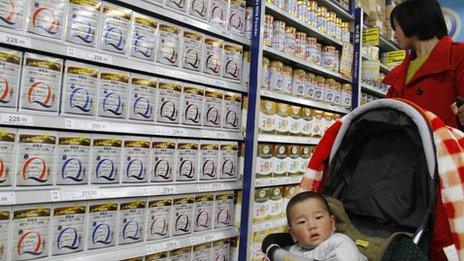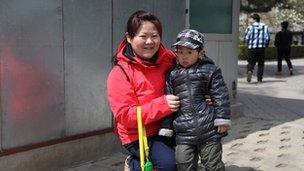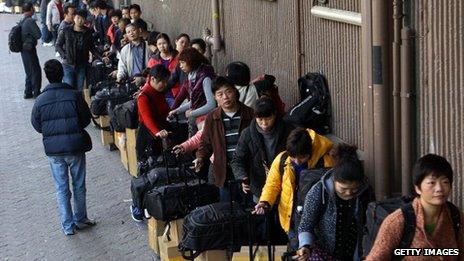Baby milk rationing: Chinese fears spark global restrictions
- Published

Worried mothers in China are going to great lengths to get their hands on imported milk, causing retailers in the UK and elsewhere to ration sales.
When a child is born in China, anxious new parents often prize one gift above all others: imported formula baby milk, usually hand-carried from overseas to ensure it's the real thing.
Fearful of the dangerous levels of hormones and chemicals sometimes found in Chinese baby formula, parents in mainland China often go to great lengths to secure foreign brands.
"My child only drank formula that was posted from Japan by my cousin who was studying there," explains Liu Fang in Beijing, the mother of a three-year-old boy.

Ms Fang says she imported baby formula from Japan and the US for her son
"When the Japanese nuclear power plant leaked, my son drank American formula which was mailed from the US."
Long-term breastfeeding is rare among Chinese mothers, who often doubt the quality of their breast milk.
Those who can afford it choose to buy imported formula over Chinese brands.
Tainted history
Most parents believe they have good reason to be worried.
In 2008, six infants died of severe kidney damage and an estimated 300,000 babies suffered painful kidney stones after drinking tainted baby formula.
After testing, formula from several major Chinese dairy companies was found to contain melamine, an additive that falsely boosts the protein levels in milk.
Since then, a regular stream of similar food safety crises has served to underline many parents' belief that food products stamped "Made in China" are unsafe for children.
Almost every product on Chinese supermarket shelves has been tainted by some sort of scandal in recent years, including bacteria-laden pork that glows in the dark and repackaged cooking oil siphoned from the gutters outside restaurants.
Milk formula scandals also continue to hit China's headlines.
In December 2011 and July 2012, two Chinese companies, Mengniu and Ava Dairy, recalled baby formula containing high amounts of aflatoxin, a carcinogen produced by fungus in cows' feed.
Last June, a third company, Yili Group, issued a separate recall after "unusually high" levels of mercury were found in its main line of infant milk powder.
Growing demand
Yan Angeli says she sometimes has to search several supermarkets to find her son's brand of baby milk formula
The result? China's so-called "4-2-1 families", made up of four grandparents and two parents doting on a single child, pool their money and scour the globe for safe sources of food.
Some buy imported baby formula from online stores, which regularly post photos displaying walls of baby formula amassed from overseas.
"My warehouse is full of baby formula!" posted one online seller who calls herself Sunshine Grass.
"My husband purchased it in Canada and packed it himself, so it's definitely not fake."
One common brand of milk powder, Enfrapro, costs approximately $22 (£14) per tin in Canada but re-sells for an average of $44 on Taobao, a popular online retailer in China.
Global impact

Mainland Chinese have been flocking to Hong Kong to buy baby milk
The prospect of huge profits available to formula sellers in China has had a knock-on effect for retailers around the world.
Hong Kong's government was the first one to put a limit on purchases, not surprisingly given its proximity to China and the number of Chinese that travel there for shopping.
It has prevented all customers from purchasing more than two cans of formula a day. Those caught breaking the rules face up to two years in prison and a $64,500 fine.
But the growing Chinese demand is now beginning to have an impact on countries outside Asia.
Retailers in Australia and the UK have followed suit, limiting the number of cans of formula that can be sold to a customer within a single day.
Winning back trust
The Chinese government is attempting to solve the baby formula problem at home by strengthening its food monitoring system.
Last month, Beijing elevated the political status of the country's food and drug watchdog, in the hope that parents would learn to trust the products produced within China.
So far, the plan has done little to calm concerns.
Standing outside Beijing's largest maternity hospital, a woman who is expecting her first child in August looks frustrated when asked how she plans to feed her unborn child.
"We can't find imported milk. It was easier a couple of months ago, but now I heard Chinese Customs are getting stricter," frets Ms Li, refusing to disclose her first name.
"Even if there is only a 1% chance that Chinese formula is not safe, I don't want to be that 1%."
- Published8 April 2013
- Published9 April 2013
- Published8 April 2013
- Published1 March 2013
- Published8 January 2013